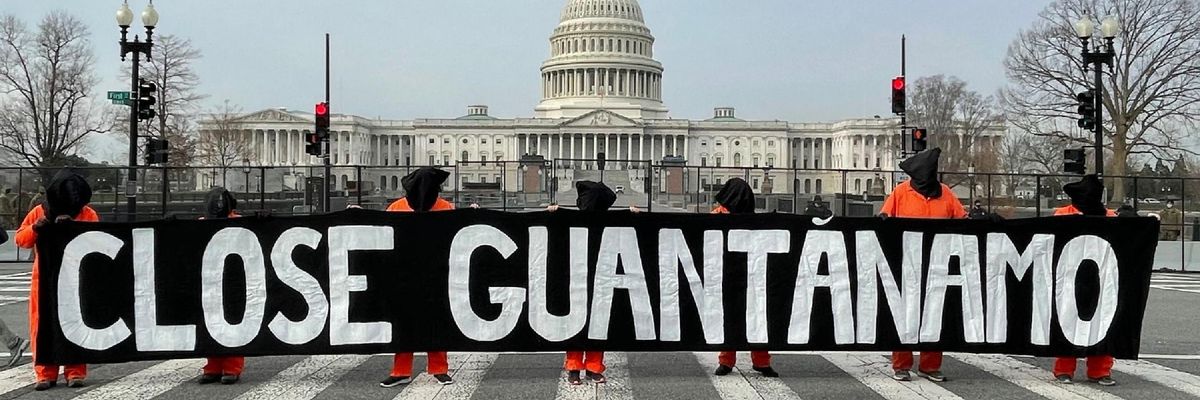Blasting the continued imprisonment of detainees cleared for release at the U.S. military prison at Guantanamo Bay Naval Base as "outrageous and shameful," Amnesty International on Tuesday responded to news that the Biden administration has approved three more Gitmo inmates for release by repeating its long-standing call for the facility's closure.
"Amnesty International USA is calling on President Biden immediately to appoint a high-level official in his administration to take charge of closing Guantanamo."
--Daphne Eviatar,
Amnesty International
The Biden administration announced Monday that three detainees--none of whom has ever been charged with any crime--have been cleared for release from Guantanamo to countries that will agree to impose security restrictions upon the men, the New York Timesreports.
One of men, Saifullah Paracha, is the oldest Gitmo prisoner. The 73-year-old Pakistani suffers from health problems including heart disease, diabetes, and high blood pressure. He has been imprisoned at Guantanamo without charge or trial for nearly 18 years.
Uthman Abdul al-Rahim Uthman, a 40-year-old Yemeni national who has been held without charge at Guantanamo since the prison opened in January 2002, was also cleared for release on Monday, as was Abdul Rabbani, a Pakistani.
Human rights defenders have long argued that piecemeal detainee releases only serve to prolong one of the darkest chapters in modern U.S. history.
Daphne Eviatar, director of the Security Within Human Rights program at Amnesty International USA, said in a statement responding to Monday's announcement that "it is not enough for the Biden administration to announce that more detainees are cleared for release when the government has not made any plans for how it will let cleared detainees finally experience freedom."
"Nine people are currently cleared for release at Guantanamo and some have been cleared for more than a decade, yet they are still stuck," she said. "This is an outrageous and shameful violation of human rights. President [Joe] Biden cannot have true credibility advocating for other countries to respect human rights if he does not prioritize closing Guantanamo."
"Amnesty International USA is calling on President Biden immediately to appoint a high-level official in his administration to take charge of closing Guantanamo and arranging the transfers of all detainees who are not charged with crimes, a critical first step to ending the indefinite detention of the detainees there," Eviatar added.
While the three detainees' new clearance does not mean their freedom is imminent, Paracha's attorney told the Associated Press that "there are no impediments to his return" to Pakistan, and that she believes he will be released within the next few months.
"Nine people are currently cleared for release at Guantanamo and some have been cleared for more than a decade, yet they are still stuck. This is an outrageous and shameful violation of human rights."
--Eviatar
According to the Times, the last known transfer of a Guantanamo detainee to Pakistan occurred in 2008 during the George W. Bush administration. The Barack Obama administration halted all homebound transfers of Yemeni Gitmo prisoners in 2010 due to concerns they might join al-Qaeda in the Arabian Peninsula as Yemen slid toward civil war.
There have been great delays and difficulties in finding suitable countries to relocate former Guantanamo prisoners, some of whom have described life after release as a different kind of prison. Some former Gitmo detainees have been relocated far from their homelands in countries where they have sometimes struggled to adjust to unfamiliar ways of life.
A small handful, like Mohamedou Ould Slahi--a Mauritanian citizen whose torturous 14-year Gitmo ordeal is the subject of an award-winning 2021 feature film--have found fame, even as they face severe restrictions on their freedom.
Others have returned--or in the case of the many Guantanamo prisoners who were innocent, have taken--to the battlefield as they seek revenge on their former captors and tormentors.
In 2003, Paracha, a businessman and legal U.S. resident, was lured from his home in Karachi, Pakistan to Bangkok, Thailand as part of an FBI entrapment operation in which American agents posed as representatives of the retail chain Kmart seeking a merchandising deal.
Instead of finding a deal, Paracha found himself hooded and shackled as he was flown to the U.S. air base at Bagram, Afghanistan, where multiple detainees in the so-called War on Terror were tortured to death in late 2002. There, Paracha learned he was being accused of aiding al-Qaeda fighters. He was subsequently sent to Guantanamo Bay, which was also the site of widespread U.S. torture at the time.
Although Paracha admits to holding $500,000 for al-Qaeda operatives including alleged 9/11 mastermind Khalid Sheikh Mohammed, he maintains he was unaware of their identities or ties to terrorism and was just helping them as he would any Muslim.
During the tenure of Obama--who ultimately failed to execute his order to close Guantanamo--Paracha was deemed too innocent to charge, yet too dangerous to release. Such prisoners were subjected to a Periodic Review Board, which in April 2016 again denied Paracha's release.
Asked in February whether the Biden administration will move to close the military prison at Guantanamo Bay, White House Press Secretary Jen Psaki said "that certainly is our goal and our intention." Last month, two dozen members of the Senate Democratic Caucus demanded Gitmo's closure in a letter blasting the prison--where 40 men remain imprisoned--as "a symbol of lawlessness and human rights abuses."

